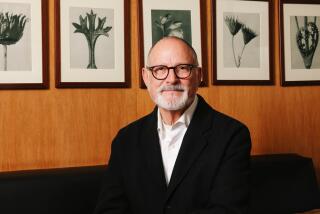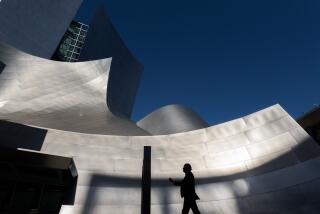The Art of Renewing a City
Credit Santa Ana with thinking in adventurous terms about how the arts can revitalize a downtown area. Since the mid-1990s, the city has invested more than $11 million in such projects as the renovation of the Grand Central Art Center, a complex of galleries and studios that also houses a small theater. It has renovated an auto shop into the Orange County Center for Contemporary Art; it has offered $1.7 million in seed money to help the High School of the Arts establish a downtown presence; it has absorbed millions in land costs for a planned development of 86 residence-and-studio lofts.
Eleven million dollars isn’t a lot of money to transform a city neighborhood, but the work done thus far has created valuable momentum. While much of the revitalization has gone into the visual arts, the performing arts are much trickier to get established.
It costs a lot more to run a theater than a gallery, and providing suitable venues for various sizes of performance is difficult. The small theaters that do exist have been struggling, but the city should not give up on performing arts, because having more theaters and concert venues would complement the galleries and studios by creating a real urban hub to attract people from all over the region.
Performing arts may have to take a secondary role to visual arts, a reality that has been understood by those grappling with the future of downtown. The area faces tough competition in performing arts from the prominent venues of the Orange County Performing Arts Center and South Coast Repertory in Costa Mesa.
There are bright spots. For example, the Main Street Players, a nonprofit community theater group, has been offering three shows a season and has benefited in attendance from the area’s revitalization.
However, the Orange County High School of the Arts has had to take many of its productions on the road and currently lacks the large venue it should have. The increase in rent at the Empire Theater has put the feisty Rude Guerrilla Theater Company in a bind.
There may be ways the city can work with potential donors to small theaters, or to help lock in favorable long-term rental agreements to allow innovative theater to take root and not be priced out. Parking validation arrangements for theater patrons also could help keep the cost of a night in the theater district down.
There already is a lot of creative and imaginative energy in the district, which has created a good climate to foster more innovation. For example, Don Cribb was able to see the abandoned Grand Central Building and look beyond its problems to make it a centerpiece of a new arts scene.
The dramatic decline in vacant storefronts and in drugs and gangs is a credit to the vision of such people. Monthly art walks have been attracting 1,000 or more visitors to some 50 galleries.
Now the city must do some fine-tuning to keep the momentum going. The idea of a vital downtown city district to complement suburban life in Orange County is a dream worth holding onto and fostering.
More to Read
The biggest entertainment stories
Get our big stories about Hollywood, film, television, music, arts, culture and more right in your inbox as soon as they publish.
You may occasionally receive promotional content from the Los Angeles Times.










